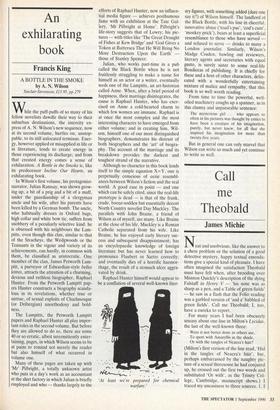An exhilarating book
Francis King
A BOTTLE IN THE SMOKE by A. N. Wilson
Sinclair-Stevenson, £13.95, pp.279
While the puff-puffs of so many of his fellow novelists dawdle their way to their suburban destinations, the intercity ex- press of A. N. Wilson's new sequence, now at its second volume, hurtles on, unstop- pable, to its still unlocated terminus. Ener- gy, however applied or misapplied in life or in literature, tends to create energy in those experiencing its discharge; and from that created energy comes a sense of exhilaration. A Bottle in the Smoke is, like its predecessor Incline Our Hearts, an exhilarating book.
In Wilson's first volume, his protagonist- narrator, Julian Ramsay, was shown grow- ing up, a bit of a prig and a bit of a muff, under the guardianship of a clergyman uncle and his wife, after his parents have been killed by a German bomb. The uncle, who habitually dresses in Oxford bags, high collar and white bow tie, suffers from snobbery of a peculiarly selective kind: he is obsessed with his neighbours the Lam- pitts, even though this clan, similar to that of the Stracheys, the Wedgwoods or the Tennants in the vigour and variety of its achievements, can hardly, in common with them, be classified as aristocratic. One member of the clan, James Petworth Lam- pitt, a purveyor of Edwardian-style belles lettres, attracts the attention of a charming, devious and ruthless biographer, Raphael Hunter. From the Petworth Lampitt pap- ers Hunter constructs a biography scanda- lous in its revelations, whether true or untrue, of sexual exploits of Charlusesque (or Dribergian) unorthodoxy and bold- ness.
The Lampitts, the Petworth Lampitt papers and Raphael Hunter all play impor- tant roles in the second volume. But before they are allowed to do so, there are some 40 or so erratic, albeit intermittently enter- taining, pages, in which Wilson seems to be at pains to remind not merely the reader but also himself of what occurred in volume one.
Many of these pages are taken up with 'Mr' Pilbright, a totally unknown artist who puts in a day's work as an accountant at the shirt factory in which Julian is briefly employed and who — thanks largely to the efforts of Raphael Hunter, now an influen- tial media figure — achieves posthumous fame with an exhibition at the Tate Gal- lery, 'Mr Pilbright at Home'. Pilbright's life-story suggests that of Lowry; his pic- tures — with titles like 'The Great Draught of Fishes at Kew Bridge' and 'God Gives a Token at Battersea That He Will Bring No More Destruction Upon the Earth' those of Stanley Spencer.
Julian, who works part-time in a pub called the Black Bottle when he is not fruitlessly struggling to make a name for himself as an actor or a writer, eventually weds one of the Lampitts, an art-historian called Anne. When, after a brief period of happiness, their marriage disintegrates, the cause is Raphael Hunter, who has exer- cised on Anne a cold-hearted charm to which few women are immune. Raphael is at once the most complex and the most interesting character to have emerged from either volume; and in creating him, Wil- son, himself one of our most distinguished biographers, demonstrates his distrust of both biographers and the 'art' of biogra- phy. The account of the marriage and its breakdown provides the darkest and toughest strand of the narrative.
Although no character in this book lends itself to the simple equation X=Y, one is perpetually conscious of eerie resembl- ances between Wilson's fiction and the real world. A good case in point — and one which can be safely cited, since the real-life prototype is dead — is that of the frank, crude, booze-sodden but essentially decent North Country novelist Day Muckley. The parallels with John Braine, a friend of Wilson as of myself, are many. Like Braine at the close of his life, Muckley is a Roman Catholic separated from his wife. Like Braine, he has enjoyed early literary suc- cess and subsequent disappointment; has an encyclopaedic knowledge of foreign literature but has never learned how to pronounce Flaubert or Sartre correctly; and eventually dies of a horrific haemor- rhage, the result of a stomach ulcer aggra- vated by drink.
Raphael Hunter himself would appear to be a conflation of several well-known liter-
'At . . •
least we're prepared for chemical warfare.' ary figures, with something added (dare one say it?) of Wilson himself. The landlord of the Black Bottle, with his line in cheerful, innovative abuse ('toad's pus', 'cod's cunt', 'monkey prick'), bears at least a superficial resemblance to those who have served and refused to serve — drinks to many a London journalist. Similarly, Wilson's Madge Cruden, bawling out reviewers. literary agents and secretaries with equal gusto, is surely sister to some reat-life Boadiceas of publishing. It is chiefly for these and a host of other characters, delin- eated with a wonderfully entertaining mixture of malice and sympathy, that this book is so well worth reading.
From time to time the powerful, well- oiled machinery coughs up a spanner, as in this clumsy and unparseable sentence:
The mysterious girl . . . who appears so often in his pictures was thought by critics to have been a creature of his imagination, purely, but never knew, for all that she inspired his imagination for more than twenty-five years.
But in general one can only marvel that Wilson can write so much and yet continue to write so well.


















































 Previous page
Previous page